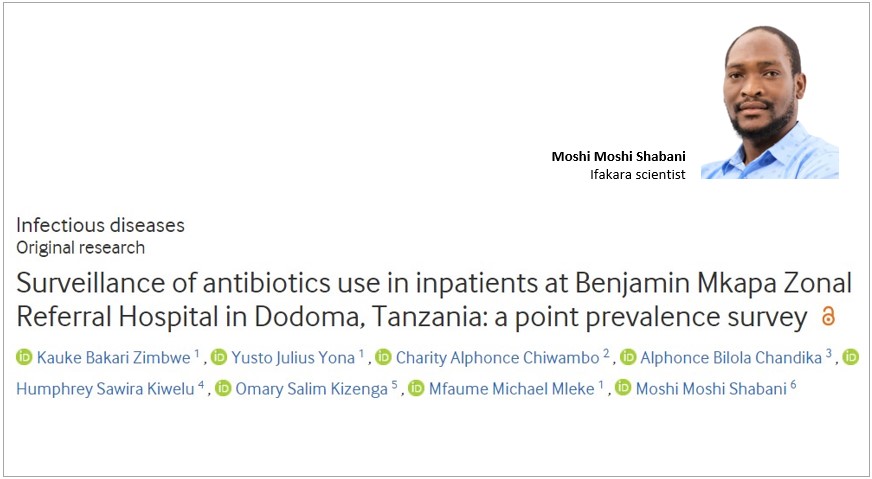
DRUG RESISTANCE: Study calls for improved antibiotic prescribing practices in Tanzania

A new study led by a team of scientists from various health institutions in Tanzania has underlined the need for improved antibiotic prescribing practices. The study emphasizes the importance of clinicians prioritizing evidence-based antibiotic prescribing to combat antimicrobial resistance (AMR) effectively.
Assessment of antibiotic use at BMH
The scientists, including Moshi Moshi Shabani from Ifakara Health Institute, made these recommendations following a 2023 survey assessing antibiotic use among inpatients at Benjamin Mkapa Zonal Referral Hospital (BMH) in Dodoma, Tanzania. The hospital has significantly reduced antibiotic use among inpatients but also identified a need for ongoing improvements in prescribing practices.
The study analyzed 286 inpatient prescriptions using the World Health Organization-Point Prevalence Survey (WHO-PPS). Published on the BMJ Open journal, the findings revealed that BMH has successfully reduced antibiotic use and improved infection control, marking significant progress in the fight against antimicrobial resistance (AMR).
BMH remarkable progress since 2019
Since 2019, BMH has made remarkable progress in optimizing antimicrobial use (AMU) and enhancing infection prevention. Improvements include training healthcare providers such as prescribers, pharmacists, nurses, and laboratory scientists on AMS, consumption, and susceptibility testing.
The hospital has also enhanced testing programs to ensure accurate antibiotic prescribing, including introducing its first formulary in 2021 to guide antibiotic prescribing and monitor usage. The hospital also conducts biannual reviews of antibiotic prescriptions to ensure they meet clinical standards.
BMH's success in reducing antimicrobial prescriptions
These efforts have yielded impressive results, leading to a significant reduction in antimicrobial prescriptions among admitted patients. BMH decreased antibiotic use among inpatients compared to the 2019 WHO-PPS.
The 2023 WHO-PPS surveillance found that only 30.07% of admitted patients were prescribed antibiotics, down from 65.6% in 2019. This rate is also lower than the global prevalence of 34.4% reported in 2018, highlighting the effectiveness of BMH’s initiatives in promoting rational antibiotic use.
Comparisons with other regions, countries
According to the scientists, BMH’s progress is particularly notable compared to other regions and countries. The highest prevalence of AMU was reported in Northern Nigeria (80.1% in 2020), while studies in Sri Lanka and Ghana indicated usage rates of 35.1%, 60.5%, and 54.9%, respectively. In contrast, BMH’s AMU rate is lower than that of most hospitals in Africa, with only one study in South Africa reporting a lower rate.
"Our findings indicate improvements and good practices in antimicrobial prescribing at BMH. Antimicrobial use at BMH in this study is also lower compared with a single center in a recent study in Northwest Tanzania, which reported 94.8%," noted the scientists.
Continued efforts needed
While the hospital has made strides in reducing antibiotic use, adherence to National Treatment Guidelines remains suboptimal, emphasize the scientists. They also recommend that clinicians at BMH and other healthcare facilities increase their use of AST results to guide antibiotic prescribing.
"We recommended conducting serial WHO-PPS annually to address different seasons and ensure enough evidence is available to strengthen advanced ASPs. These findings will contribute to developing antibiotic prescribing policies for empirical treatments and surgical prophylaxis."
"Clinicians are advised to use AST results to foster antibiotic prescribing more effectively. Further studies are recommended to explore rational prescribing for UTIs and surgical prophylaxis, along with capacity building to improve the yield of samples for Culture and AST to tailor antibiotic selection and prescribing."
Positive steps towards better antibiotic stewardship
The study's findings represent a positive step towards better antibiotic stewardship at BMH, but they also underscore the importance of continued efforts to refine and improve prescribing practices. By utilizing AST results more effectively and adhering more closely to treatment guidelines, BMH can set a benchmark for other healthcare facilities in Tanzania and beyond.
Read the publication here.
